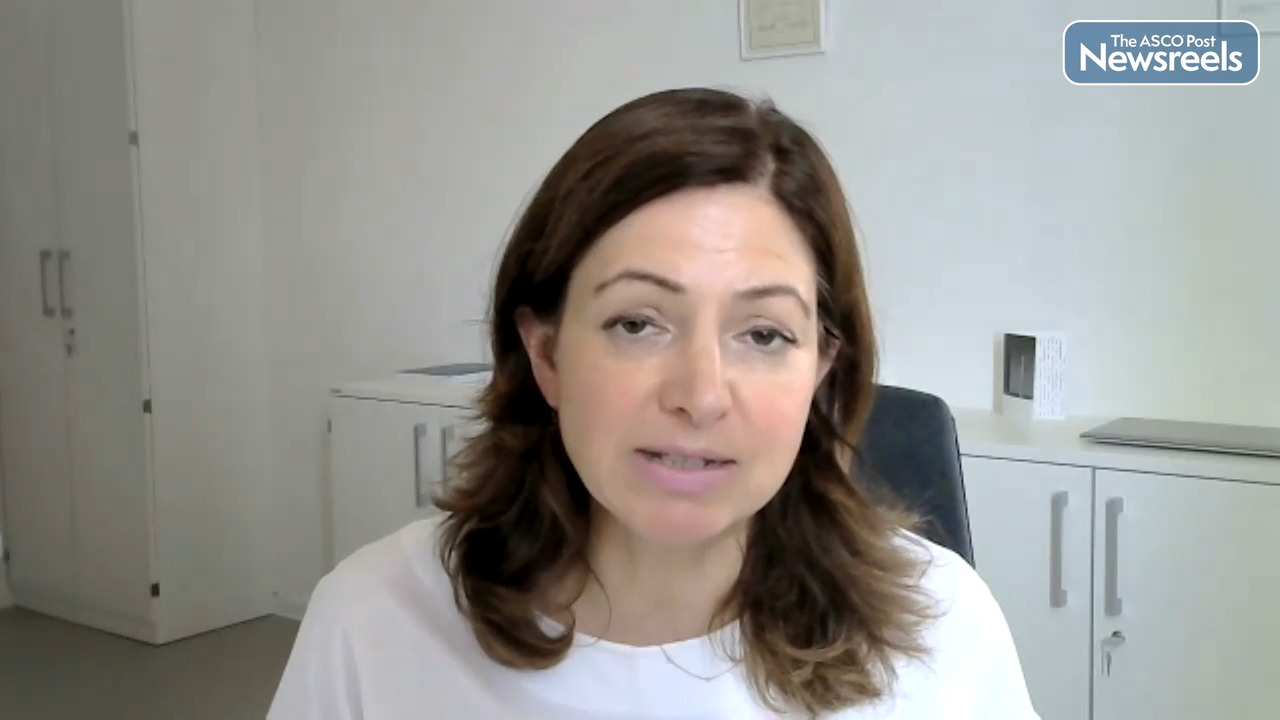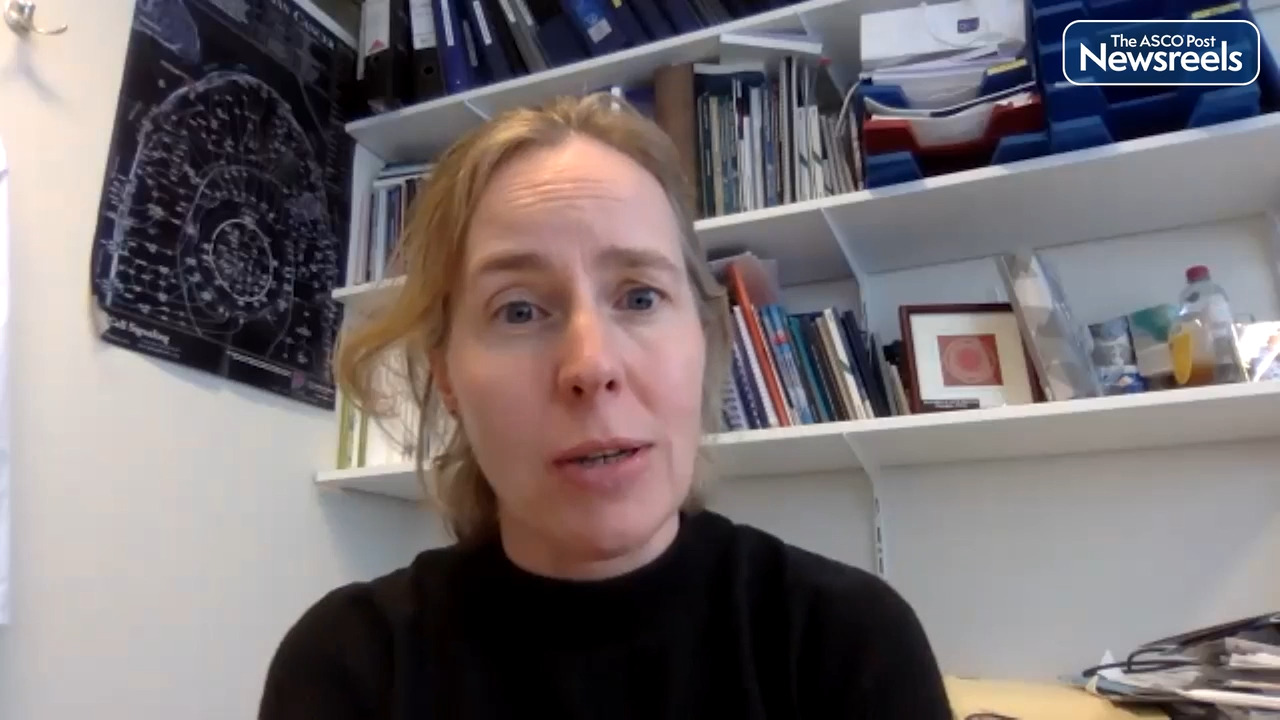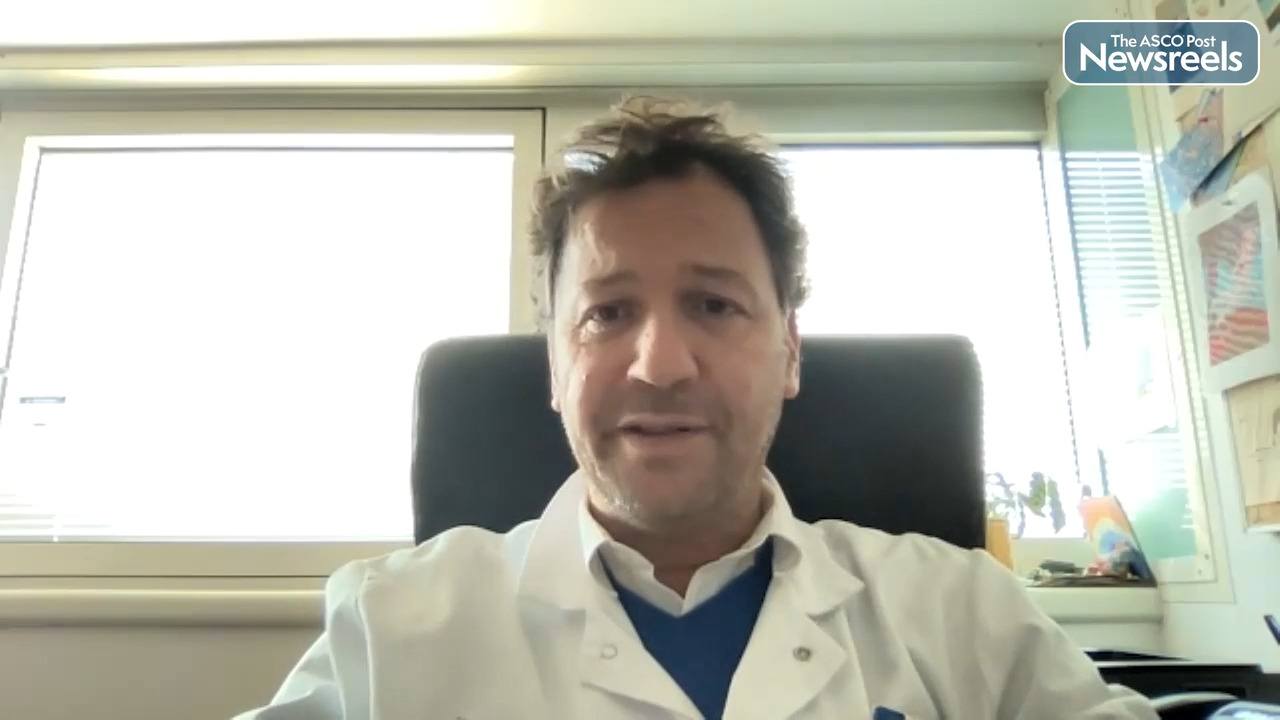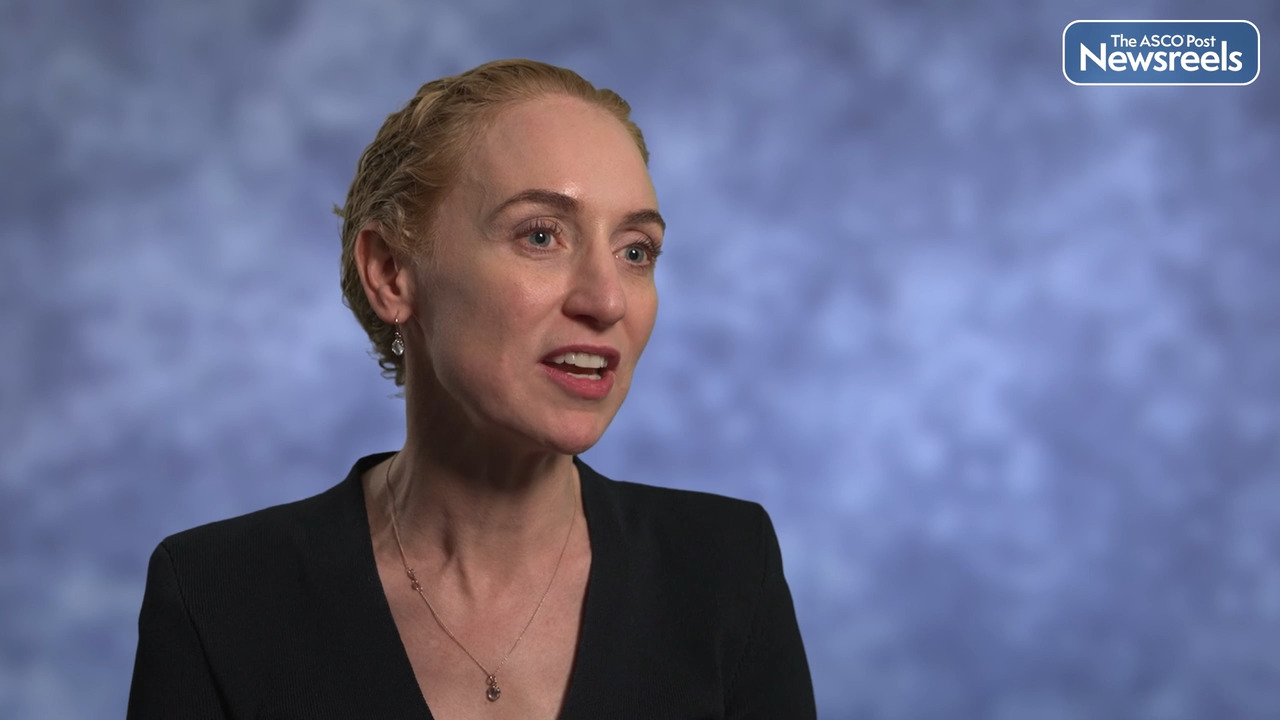Identifying Patients With Ovarian Cancer With Greatest Potential Benefit From First-Line Bevacizumab
In a study reported in the Journal of Clinical Oncology, Benoit You, MD, PhD, and colleagues found that an unfavorable CA-125 elimination rate constant K (KELIM) score, indicating poorer tumor chemosensitivity, was associated with derived benefit from first-line bevacizumab when given with...
Addition of Bemarituzumab to mFOLFOX in FGFR2b-Selected Gastric or Gastroesophageal Junction Adenocarcinoma
In the phase II FIGHT trial reported in The Lancet Oncology, Zev A. Wainberg, MD, and colleagues found numerically better progression-free survival with the addition of the anti-FGFR2b antibody bemarituzumab to mFOLFOX (modified fluorouracil, leucovorin, and oxaliplatin) in patients with...
First-Line Toripalimab Plus Chemotherapy in Advanced NSCLC: CHOICE-01
As reported in the Journal of Clinical Oncology by Wang et al, a Chinese phase III trial (CHOICE-01) has shown prolonged progression-free survival with the addition of the anti–PD-1 monoclonal antibody toripalimab to platinum-based chemotherapy in the first-line treatment of patients with advanced...
Phase II Trial Reports High Response Rates With Neoadjuvant Cemiplimab in Cutaneous Squamous Cell Carcinoma
In an international, multicenter phase II clinical trial, almost two-thirds of patients with stage II to IV cutaneous squamous cell carcinoma had tumors nearly or completely eradicated by neoadjuvant treatment with cemiplimab-rwlc, an agent targeting PD-1. The results were presented at the European ...
FDA Approves Teclistamab-cqyv for Relapsed or Refractory Multiple Myeloma
On October 25, the U.S. Food and Drug Administration (FDA) granted accelerated approval to teclistamab-cqyv (Tecvayli), the first bispecific B-cell maturation antigen (BCMA)-directed CD3 T-cell engager, for adult patients with relapsed or refractory multiple myeloma who have received at least four...
FDA Approves Tremelimumab Plus Durvalumab for Adult Patients With Unresectable HCC
On October 21, the U.S. Food and Drug Administration (FDA) approved tremelimumab (Imjudo) in combination with durvalumab (Imfinzi) for the treatment of adult patients with unresectable hepatocellular carcinoma (HCC), the most common type of liver cancer. The novel dose and schedule of the...
Can Patients With Cancer Treated With Immunotherapy Safely Receive mRNA COVID-19 Vaccines?
New research confirmed the safety of mRNA COVID-19 vaccines in individuals with cancer who are undergoing immunotherapy, according to a novel study published by Widman et al in JNCCN–Journal of the National Comprehensive Cancer Network. The researchers analyzed the frequency of immune-related...
Incidence of Neurologic Side Effects From CAR-T Cell Therapy Is Higher in Patients With Hypophosphatemia, Study Finds
Patients with B-cell malignancies who had hypophosphatemia experienced a higher incidence and severity of neurologic side effects from chimeric antigen receptor (CAR) T-cell therapy, according to a study by Nowicki et al published in Cancer Immunology Research. The study results imply that...
Pembrolizumab With or Without Chemotherapy vs Cetuximab/Chemotherapy in Recurrent or Metastatic Head and Neck Cancer
As reported in the Journal of Clinical Oncology by Kevin Harrington, MD, PhD, and colleagues, updated results of the phase III KEYNOTE-048 trial showed enduring survival benefits with first-line pembrolizumab alone and pembrolizumab/chemotherapy vs cetuximab/chemotherapy in patients with recurrent...
First-Line Nivolumab/Ipilimumab vs Chemotherapy in Metastatic NSCLC Without EGFR or ALK Alterations: 5-Year Survival
As reported in the Journal of Clinical Oncology by Julie R. Brahmer, MD, MSc, FASCO, and colleagues, a 5-year analysis of the phase III CheckMate 227 trial showed improvement in overall survival with first-line nivolumab/ipilimumab vs platinum-doublet chemotherapy, at ≥ 3 years after cessation of...
Expert Point of View: Debu Tripathy, MD
Debu Tripathy, MD, Professor and Chair of Breast Medical Oncology at The University of Texas MD Anderson Cancer Center, Houston, shared his thoughts on TROPiCS-02 with The ASCO Post. He said the study is important because it addresses the needs of “a population with limited options, whose...
TROPiCS-02 Sacituzumab Govitecan Effective in Hormone Receptor–Positive, HER2-Negative Metastatic Breast Cancer
For advanced breast cancer that is hormone receptor–positive and HER2-negative, sacituzumab govitecan-hziy significantly reduced the risk of disease progression by 34% over physician’s choice of treatment, based on the results of the phase III TROPiCS-02 trial.1 The heavily pretreated patients in...
T-DXd Improves Progression-Free Survival vs T-DM1 in Metastatic HER2-Positive Breast Cancer
As reported in The New England Journal of Medicine by Javier Cortés, MD, PhD, of the International Breast Cancer Center, Barcelona, and colleagues, the phase III DESTINY-Breast03 trial has shown significantly prolonged progression-free survival with fam-trastuzumab deruxtecan-nxki (T-DXd) vs...
T-DXd Shows Efficacy Against Active Brain Metastases in HER2-Positive Breast Cancer
In the single-center phase II TUXEDO-1 trial of patients with advanced HER2-positive breast cancer, fam-trastuzumab-deruxtecan-nxki (T-DXd) showed efficacy in patients with active brain metastases, yielding intracranial responses in 73.3% of the population and a median progression-free survival of...
Expert Point of View: Patricia LoRusso, DO, PhD
Invited discussant Patricia LoRusso, DO, PhD, of Yale School of Medicine, said to the assembled audience at the 2022 ASCO Annual Meeting: “I see you are as excited about these data as I am,” after the applause ended following Dr. Modi’s presentation. “I want to thank our colleagues for helping to...
DESTINY-Breast04 Trial: T-DXd Significantly Improves Survival in Patients With HER2-Low Metastatic Breast Cancer
The antibody-drug conjugate fam-trastuzumab deruxtecan-nxki (T-DXd) doubled progression-free survival compared with chemotherapy alone in patients with “HER2-low” metastatic breast cancer—ie, patients with low levels of HER2 expression. The agent also extended overall survival for patients with low ...
Expert Point of View: Debu Tripathy, MD, and Hope S. Rugo, MD, FASCO
The ASCO Post asked Debu Tripathy, MD, Professor and Chair of Medical Breast Oncology at The University of Texas MD Anderson Cancer Center, Houston, and Hope S. Rugo, MD, FASCO, Professor of Medicine, Director of Breast Oncology and Clinical Trials Education at the University of California San...
Datopotamab Deruxtecan Shows Activity in Advanced Triple-Negative Breast Cancer
Datopotamab deruxtecan, an antibody-drug conjugate directed against trophoblast cell surface antigen-2 (Trop-2), is showing promise as a treatment for relapsed or refractory advanced triple-negative breast cancer, according to early findings from the phase I TROPION-PanTumor01 trial presented...
Addition of Pembrolizumab to Chemotherapy Improves Event-Free Survival in Triple-Negative Breast Cancer
As reported in The New England Journal of Medicine by Peter Schmid, MD, PhD, of Barts Cancer Institute, Queen Mary University of London, and colleagues, a preplanned interim analysis of the phase III KEYNOTE-522 trial has shown improved event-free survival with the addition of pembrolizumab to...
BEGONIA Trial Reports Activity With Datopotamab Deruxtecan Plus Durvalumab in Triple-Negative Breast Cancer
Preliminary results of the basket BEGONIA trial showed that the antibody-drug conjugate datopotamab deruxtecan (Dato-DXd), paired with the immune checkpoint inhibitor durvalumab, has strong activity in advanced or metastatic triple-negative breast cancer among patients not biomarker-selected for...
Expert Point of View: Angela DeMichele, MD, MSCE
Angela DeMichele, MD, MSCE, the Alan and Jill Miller Professor in Breast Cancer Excellence at the Perelman School of Medicine of the University of Pennsylvania in Philadelphia, commented on NIMBUS1 for The ASCO Post. She said obtaining information on tumor mutational burden is simple, as it is part ...
Dual Checkpoint Inhibitor Therapy Elicits Responses in Highly Mutated Breast Cancer
Patients with advanced HER2-negative metastatic breast cancer and high tumor mutational burden achieved responses—often durable—from treatment with the immunotherapy doublet of nivolumab and ipilimumab, according to results of the phase II NIMBUS trial reported at the 2021 San Antonio Breast Cancer ...
Mediterranean Diet May Improve Immunotherapy Response Rates and Progression-Free Survival in Advanced Melanoma, New Study Suggests
Following a Mediterranean diet rich in fiber, monounsaturated fatty acids, and polyphenols may be associated with improved immunotherapy response rates and progression-free survival in patients with advanced melanoma, according to a recent study presented at the United European Gastroenterology...
Enfortumab Vedotin-ejfv Plus Pembrolizumab in Cisplatin-Ineligible Patients With Advanced Urothelial Cancer
In a phase Ib/II study reported in the Journal of Clinical Oncology, Christopher J. Hoimes, MD, and colleagues found that first-line enfortumab vedotin-ejfv plus pembrolizumab produced a high response rate and prolonged response durations in cisplatin-ineligible, previously untreated patients with...
Expert Point of View: Meritxell Bellet Ezquerra, MD, PhD
TROPiCS-02 is a statistically positive trial, with the primary endpoint met and also now with an overall survival gain of 3.2 months,” said the study’s invited discussant Meritxell Bellet Ezquerra, MD, PhD, a senior researcher at the Vall d’Hebron Institute of Oncology, Barcelona. “TROPiCS-02 is...
TROPiCS-02: Sacituzumab Govitecan Improves Overall Survival in Hormone Receptor–Positive, HER2-Negative Breast Cancer
An overall survival benefit has now emerged for sacituzumab govitecan-hziy in women with previously treated, hormone receptor–positive/HER2-negative, locally recurrent, inoperable or metastatic breast cancer, according to a planned second interim analysis of the phase III TROPiCS-02 trial.1 The...
Expert Point of View: Mary O’Brien, MD
Formal discussant of the KEYNOTE-189 and KEYNOTE-407 trials, Mary O’Brien, MD, Head of the Lung Unit, Royal Marsden Hospital, NHS Foundation Trust, London, found that both studies showed consistent gains in overall and progression-free survival with pembrolizumab/chemotherapy, but she expressed...
5-Year Follow-up Supports Survival Benefit of Pembrolizumab Plus Chemotherapy in Squamous and Nonsquamous NSCLC
Pembrolizumab (anti–PD-1 therapy) plus chemotherapy continued to demonstrate a survival benefit and durable responses as first-line treatment of metastatic non–small cell lung cancer (NSCLC), according to the results of two phase III trials.1,2 Five-year overall survival was improved in both...
Expert Point of View: Alexander M.M. Eggermont, MD; Omid Hamid, MD; and James Larkin, PhD
The results of SWOG S18011 were met with enthusiasm by attendees at the Presidential Symposium of the European Society for Medical Oncology (ESMO) Congress 2022. The ASCO Post captured the thoughts of several melanoma experts, who had somewhat different ideas about the immediate clinical...
SWOG S1801: Addition of Neoadjuvant Pembrolizumab to Adjuvant Pembrolizumab Yields Benefits in High-Risk Resectable Melanoma
In resectable stage III to IV melanoma, three cycles of neoadjuvant pembrolizumab followed by adjuvant pembrolizumab was significantly more beneficial than adjuvant pembrolizumab alone, based on the results of the phase II SWOG S1801 trial presented in a Presidential Symposium at the European...
COSMIC-313: Triplet Therapy Is Active in Renal Cell Carcinoma, but Toxicities Pose a Challenge
The addition of cabozantinib to nivolumab plus ipilimumab prolonged progression-free survival in untreated intermediate-risk patients with advanced renal cell carcinoma (RCC), according to the first results of the phase III COSMIC-313 trial. These findings were presented as a Presidential Symposium ...
Addition of PD-1 Inhibitor Serplulimab to Chemotherapy in the First-Line Treatment of Extensive-Stage SCLC
As reported in JAMA by Cheng et al, an interim analysis of the phase III ASTRUM-005 trial has shown that the addition of the PD-1 inhibitor serplulimab to chemotherapy improved overall survival in the first-line treatment of patients with extensive-stage small cell lung cancer (SCLC). Study ...
Adjuvant Nivolumab/Ipilimumab vs Nivolumab in Resected Stage IIIB–D or IV Melanoma
As reported in the Journal of Clinical Oncology by Jeffrey S. Weber, MD, PhD, and colleagues, the phase III CheckMate 915 trial showed no improvement in recurrence-free survival with adjuvant nivolumab/ipilimumab vs nivolumab in patients with resected stage IIIB–D or IV melanoma. Study Details In...
GPRC5D-Targeted CAR T-Cell Therapy in Heavily Pretreated Patients With Multiple Myeloma
In a single-institution phase I study reported in The New England Journal of Medicine, Sham Mailankody, MBBS, and colleagues found that chimeric antigen receptor (CAR) T cells targeting G protein–coupled receptor, class C, group 5, member D (GPRC5D) were active in heavily pretreated patients with...
Real-World Evidence Confirms Survival Benefit of Durvalumab in Locally Advanced Non–Small Cell Lung Cancer
In locally advanced non–small cell lung cancer (NSCLC), immunotherapy consolidation with the PD-L1 inhibitor durvalumab improved overall survival in the PACIFIC trial,1 thus leading to its use after chemoradiotherapy as a standard of care. Real-world evidence of durvalumab’s effect on overall and...
DART Trial: Concurrent Radiotherapy Plus Durvalumab Active in Older Patients With Locally Advanced Lung Cancer
Interim results of a phase II study have demonstrated the safety and feasibility of treating elderly and frail patients with locally advanced non–small cell lung cancer (NSCLC) with the monoclonal antibody durvalumab during and after radiation therapy, without chemotherapy. The results of a...
Barbara Eichhorst, MD, on CLL: Venetoclax and Obinutuzumab With or Without Ibrutinib vs Chemoimmunotherapy
Barbara Eichhorst, MD, of the German CLL Study Group and the University of Cologne, discusses phase III findings from the GAIA/CLL13 trial, which showed that time-limited treatment with venetoclax, obinutzumab, and ibrutinib or venetoclax plus obinutzumab improved progression-free survival compared with standard chemoimmunotherapy in fit, previously untreated patients with chronic lymphocytic leukemia (Abstract LBA2365).
Extended-Interval vs Standard-Interval Dosing of Single-Agent Pembrolizumab
In a retrospective cohort study performed in U.S. veterans reported in JAMA Oncology, Strohbehn et al found that a minority of patients receiving singe-agent pembrolizumab for cancer received the extended-interval dosing of 400 mg every 6 weeks. Analysis of efficacy measured as the time to...
Outcomes After Nonresponse and Relapse in Children and Young Adults Receiving Tisagenlecleucel for B-Cell ALL
In a retrospective study reported in the Journal of Clinical Oncology, Schultz et al found poor survival among children and young adults with lack of response to tisagenlecleucel for B-cell acute lymphoblastic leukemia (ALL). Salvage therapy after relapse was capable of inducing responses, but...
FDA Approves Biosimilar Bevacizumab-adcd for the Treatment of Six Types of Cancer
On September 28, the U.S. Food and Drug Administration (FDA) approved bevacizumab-adcd (Vegzelma), a biosimilar to bevacizumab (Avastin), for the treatment of six types of cancer: metastatic colorectal cancer; recurrent or metastatic nonsquamous non–small cell lung cancer (NSCLC); recurrent...
Marleen Kok, MD, PhD, on Triple-Negative Breast Cancer: Nivolumab Monotherapy or in Combination Therapy
Marleen Kok, MD, PhD, of The Netherlands Cancer Institute in Amsterdam, discusses the initial results from the BELLINI trial, which tested whether short-term preoperative nivolumab, either as monotherapy or in combination with low-dose doxorubicin or novel immunotherapy combinations, can induce immune activation in patients with early-stage triple-negative breast cancer with tumor-infiltrating lymphocytes (Abstract LBA13).
Changing the Algorithm for Relapsed or Refractory Large B-Cell Lymphomas
Despite a significant potential for cure, relapsed and refractory large B-cell lymphomas (LBCL) comprise the most common cause of lymphoma-related mortality. Sequential relapses reflect the limits of repeated exposure to chemotherapy, even when delivered at high doses. More than 30 years ago,...
Patients With Multiple Myeloma May Face CAR T-Cell Shortages
From microchips to automobiles, people in the United States are experiencing shortages of all kinds of products, and oncology treatments are no exception. In particular, shortages related to chimeric antigen receptor (CAR) T-cell therapy have been reported, most acutely, for B-cell maturation...
Julien Taïeb, MD, PhD, on Colorectal Cancer: Recent Findings on Avelumab vs Standard Second-Line Chemotherapy
Julien Taïeb, MD, PhD, of Paris Descartes University, discusses phase II results from the SAMCO-PRODIGE 54 trial, which shows the efficacy and safety of avelumab in the second-line treatment of patients with deficient DNA mismatch–repair microsatellite-instability metastatic colorectal cancer. According to Dr. Taïeb, the study indirectly suggests this population should be treated as soon as possible with an immune checkpoint inhibitor (Abstract LBA23).
Adjuvant Pembrolizumab in Patients With Completely Resected Stage IB to IIIA NSCLC
As reported in The Lancet Oncology by O’Brien et al, the second interim analysis of the phase III PEARLS/KEYNOTE-091 trial has shown significantly improved disease-free survival with adjuvant pembrolizumab vs placebo in patients with completely resected stage IB to IIIA non-small cell lung cancer...
Neoadjuvant Atezolizumab May Be Safe, Effective Option for Localized Non–Small Cell Lung Cancer
New data show that the immuno-oncology drug atezolizumab may be a safe and effective treatment for patients with stage IB to IIIB non–small cell lung cancer (NSCLC) prior to surgery, according to a study led by researchers with The Ohio State University Comprehensive Cancer Center–Arthur G. James...
Adjuvant Nivolumab With or Without Ipilimumab in Patients With Resected Stage IV Melanoma With No Evidence of Disease
As reported in The Lancet by Livingstone et al, the final analysis of the German phase II IMMUNED trial showed significantly improved recurrence-free survival with adjuvant nivolumab/ipilimumab and nivolumab alone vs placebo in patients with resected stage IV melanoma who had no evidence of disease ...
'Real-World' Experience With Durvalumab at the Mayo Clinic Mirrors PACIFIC Findings
Concurrent chemoradiation followed by durvalumab has become the standard of care in patients with unresectable, locally advanced non–small cell lung cancer (NSCLC), based on the PACIFIC trial.1 But clinical trials have predetermined inclusion and exclusion criteria, and they evaluate selective...
New Research From Cohort K of the EV-103 Trial of Enfortumab Vedotin for Patients With Urothelial Cancer
Researchers from Memorial Sloan Kettering (MSK) Cancer Center shared data on a treatment option for patients with bladder cancer at the European Society for Medical Oncology (ESMO) Congress 2022 (Abstract LBA73). Jonathan E. Rosenberg, MD, medical oncologist and Chief of the Genitourinary Oncology...
Georgina V. Long, MD, PhD, on Melanoma: Findings on Circulating Tumor DNA, Disease Recurrence, and Immunotherapy
Georgina V. Long, MD, PhD, of the Melanoma Institute Australia, discusses results from the CheckMate 915 trial, an analysis of the pretreatment circulating tumor DNA, along with other clinical and translational baseline factors, and their association with disease recurrence in patients with stage IIIB–D/IV melanoma treated with adjuvant immunotherapy (Abstract 788O).




